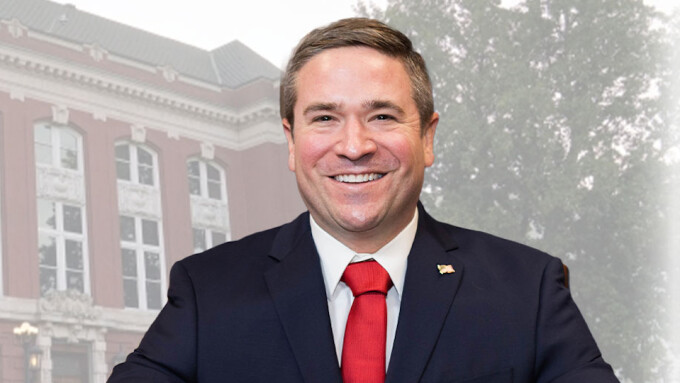JEFFERSON CITY, Mo. — Missouri Attorney General Andrew Bailey on Wednesday announced a new state regulation requiring adult sites to implement age verification of users, bypassing the legislative process in a strategy not seen before in state-level efforts to mandate age verification.
Although two age verification bills are currently pending in the Missouri state legislature — HB 236 and HB 691 — Bailey has essentially performed an end run around that process by invoking his office’s authority under the Missouri Merchandising Practices Act (MMPA), a consumer protection statute.
“This proposed rule clarifies that the failure of an individual or commercial entity to use certain commercially reasonable age verification technology to protect minors in Missouri from accessing sexually explicit content online constitutes an ‘unfair practice’ under the MMPA,” reads the new rule, 15 CSR 60-17.010.
Free Speech Coalition Director of Public Policy Mike Stabile told XBIZ, “The Missouri attorney general's move usurps the legislature, which, after extensive debate, chose not to pass a similar censorship bill last year. It appears to be a massive power grab and a distortion of both the legislative process and Missourians’ First Amendment protections.”
Industry attorney Lawrence Walters agreed, noting that while other states have passed unconstitutional age verification laws using the legislative process, this proposed rule goes a step further.
“It would create unconstitutional law out of whole cloth, completely bypassing the state legislature,” Walters told XBIZ. “We have not seen this approach used in other states, and it sets a dangerous precedent of legislating by executive fiat.”
Fellow attorney Corey D. Silverstein emphasized that the attorney general’s role is primarily to represent the state in legal matters and enforce existing laws — not to create them.
“The authority to make laws in Missouri rests with the state’s legislative branch,” Silverstein told XBIZ. “I find this very troubling because this is not the role of an attorney general, and I think is a massive step around the legislative/democratic process.”
Unlike most state age verification laws, the new Missouri rule also impacts search engines and mobile providers.
It would require search engines to blur or make unavailable any pornographic images or videos unless the search engine has implemented age verification methods to ensure that a user is over 18.
It would also require providers or operators of mobile operating systems to “provide digital age-verification identification” accessible by websites to enable their compliance with the rule.
The rule would be enforced via civil penalties of up to $10,000 per day.
In a press release, the Attorney General’s Office called the rule “the most robust age-verification standard in the country.”
Bailey’s unprecedented action could open up the way for challenges to the rule beyond the constitutional arguments that have been made against age verification laws in other states, which contend that such laws violate the First and Fourteenth Amendments.
“This would be a different type of challenge,” noted Silverstein. “It wouldn’t be a constitutional challenge to the MMPA, but instead a lawsuit on the issue of whether AG Bailey has gone outside his authority or outside what the MMPA allows him to do.”
Walters speculated that the proposed rule could face lobbying by some large companies due to the obligations it imposes on mobile providers and search engines.
“The obligation to blur search engine results appears to be a form of compelled speech, which is a separate First Amendment violation,” he said.
Stabile said he thinks it is possible that device manufacturers like Google and Apple may get involved, as well as tech platforms like Reddit and Discord.
"The law doesn't just affect adult sites, but any site with adult content," he said.
Stabile also noted Bailey’s historically “expansive” view of what constitutes “material harmful to minors,” which in the past has encompassed Pride displays at Target.
Before it can take effect, the rule will need to go through a publication and public comment process as required under Missouri law.







